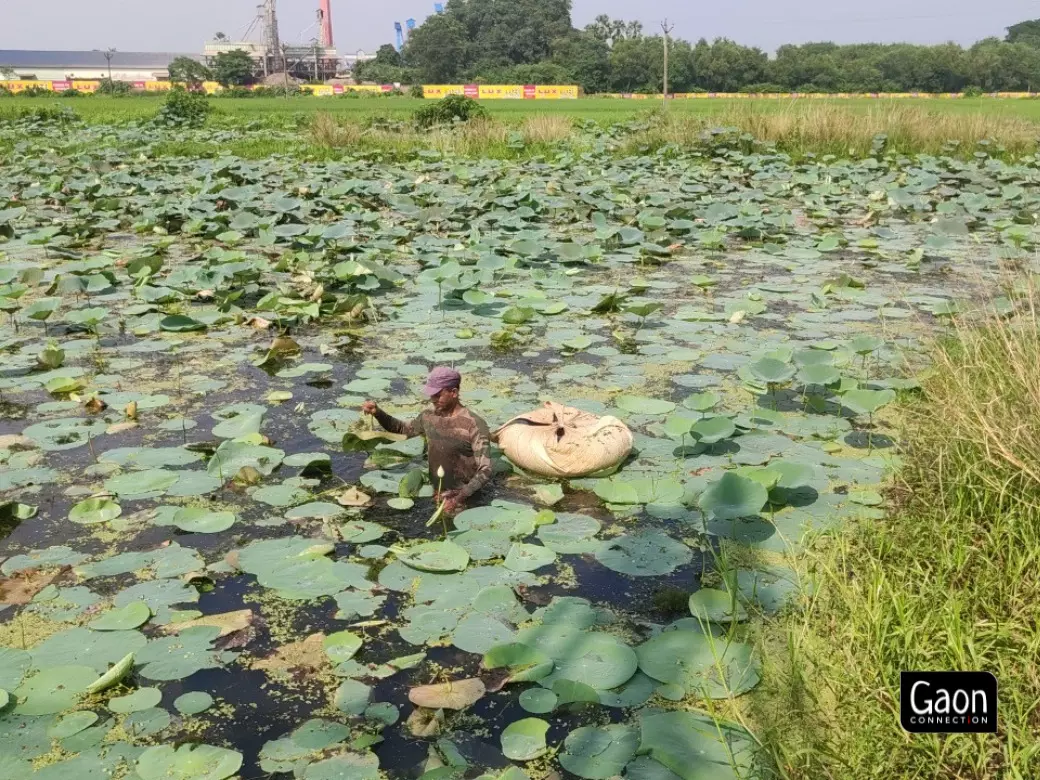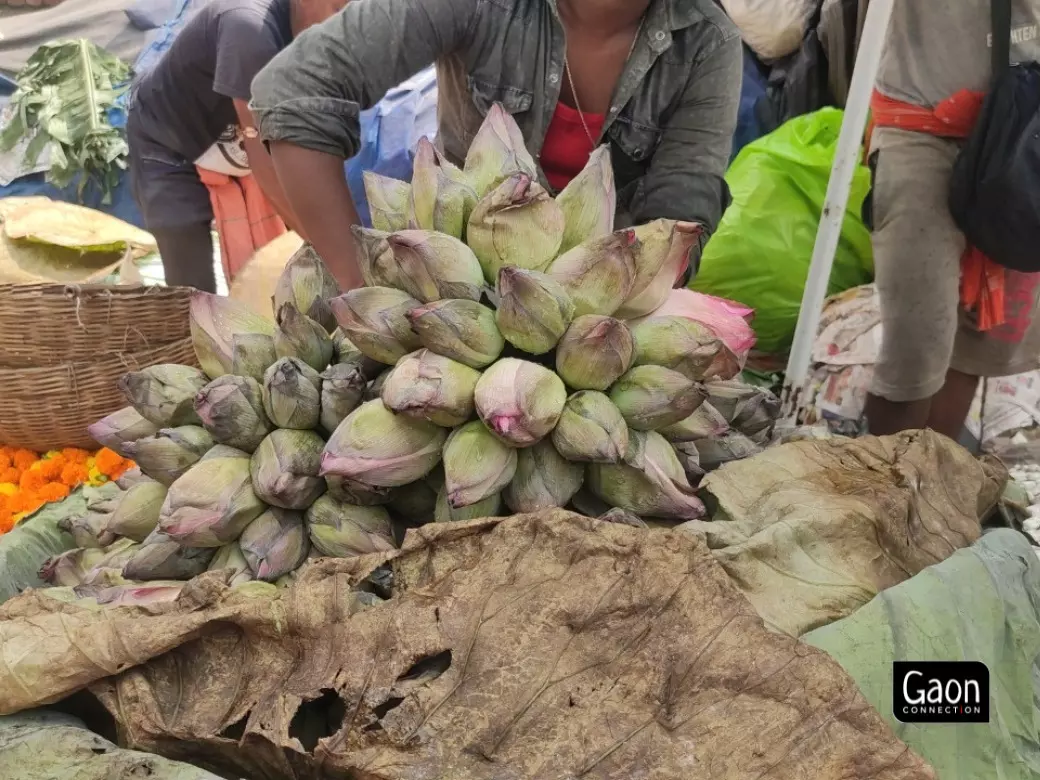Bainchi (Hooghly), West Bengal
Achinto Roy wakes up at the dead of night, every night at 2 am, and walks straight to the leased pukur (water body) located on the side of a railway track close to Bainchi railway station in Hooghly district of West Bengal.
Roy, a resident of Bainchi village, said that he had never missed his daily routine for the past six years since he started lotus farming. Neither the bone-chilling cold nor the fear of walking across the railway tracks in the dark night has deterred him from doing his duty to check on his lotus farm.
But despite all the hard work and sleepless nights, the 42-year-old farmer is unhappy because the heavy rainfall that lashed the eastern state in the middle of August this year has destroyed his lotus farm and has dealt a heavy blow to him.

The flowers were washed away by an unexpectedly heavy rainfall.
“I barely have any lotus to sell in this festive season when the demand is high and we can earn maximum,” said the lotus farmer whose village is located around 75 kilometres from Kolkata, the state capital. “It is difficult to trace even a single flower in my water body as almost all have got destroyed due to the excess rainfall,” he added.
Also Read: Flower farmers watch their profits wither as a scorching summer arrives early
Roy’s village Bainchi is the hub of lotus farming in West Bengal due to the presence of several water bodies. The national flower is extensively grown in Hooghly, East Midnapore and Howrah districts of the state, and supplied to various states and even exported to European countries.
Navratri, Durga Puja, Dussehra and Diwali are the festivals when the demand for lotus rises manifold and farmers earn good profit. But this festive season, the mood is sombre in Bainchi. The village has over 200 farmers involved in lotus cultivation on about 1,000 bighas (1 bigha = 0.619 acre) of land (water body). And all are staring at heavy losses and rising debt.

Farmers supply lotus to various states across the country during the festival.
“Sometimes we are forced to sell the flowers as less as 20-25 paisa each when there is no demand, but festivals fetch us good price of five to seven rupees per flower during the festival.But this year we have no flowers to sell,” 45-year-old Satyendra Debnath, another lotus farmer from Bainchi, told Gaon Connection.
Lotus Farming in Hooghly
The farming of lotus starts in the month of April when roots of the lotus are planted and the flowers turn ready for plucking by July. The plucking continues till October.
“Lotus needs extensive care because a damaged plant can destroy fresh plants. Also, wild bushes have to be cleared regularly to ensure that there is no other waste material,” 32-year-old Santu Pal explained to Gaon Connection.
“The pond is around five to six feet deep and the water is provided by DVC [Damodar Valley Corporation] from its dams which are connected with pipes,” he added.
Most farmers take water bodies on an annual lease to grow lotus. “I took the water body of five bigha at an annual lease of Rs 8,000. And I borrowed Rs 50,000 for farming but I am staring at a loss of Rs 40,000,” said Roy.
“Normally, I get around 5,000 flowers from one bigha but this year it has come down to just 1,000. It would be difficult to repay the loan,” the worried farmer added.
Explaining further, the 42-year-old farmer said: “The cost of production of one bigha stands at Rs 15,000, which includes high labour cost. Besides, we are always at a risk of getting bitten by venomous snakes on the railway tracks and in the pond during the lotus farming period.”

Farmers are worried about the changing rainfall patterns. Either it rains too little with long dry periods, or when it rains, there is such heavy rainfall that it washes away everything.
“We get rainfall when we don’t need it. We are beginning to understand the impact of climate change on our flower cultivation. We might suffer more losses in the future if the situation remains like this,” rued Nitya Roy, a lotus farmer.
Rising debt
“I have taken around 15 bighas of water body on an annual lease where I do lotus farming. I took a loan of around Rs 1.20 lakh for growing lotus from the flower wholesaler who charges 20 per cent commission on every sale as the interest. The loan amount stays intact and has to be repaid separately,” Apurba Mazumdar, a lotus farmer, told Gaon Connection.
“But the situation is too bad this year due to heavy rainfall and I would not be able to repay the loan. The damage has occurred this year as DVC that supplies us water released the excess water in its dams due to excess rainfall,” the farmer added.
Sometimes the farmers throw away their harvest. “We throw the flowers in the river when there is no demand and less price is offered because it would not help us to recover the transportation cost of taking them to the flower market in Kolkata,” Debnath said. But the traders make a good profit by selling the flowers at a higher price during the festival season, he added.
Also Read: Breached embankments, repair funds frozen – No celebrations for Durga Puja in villages of Howrah
Traders in Mullick Ghat in Kolkata, one of the largest wholesale flower markets of Asia, said that at present the flowers were much in demand as they are used while performing the religious rituals of Goddess Durga and also during other holy occasions.

Lotus are used to perform the religious rituals of Goddess Durga.
“At present we are selling them at a wholesale price of Rs 15-17. The retail price would be more in local markets,” a trader said. “We also send lotus to various states across the country by packaging them in containers. They are also exported to Europe by big traders who purchase the flowers from us,” he added.
But the changing climate is affecting farming business. “Overall, West Bengal didn’t receive good rainfall this monsoon season, which badly affected paddy cultivation in the state. But some areas have received heavy rainfall that has badly hit the farmers like the lotus growers,” Sourav Prokritibadi, a Howrah-based environmentalist, said. “There is a local climate variation that is happening due to climate change and the result is causing massive losses to farmers,” the environmentalist added.


















